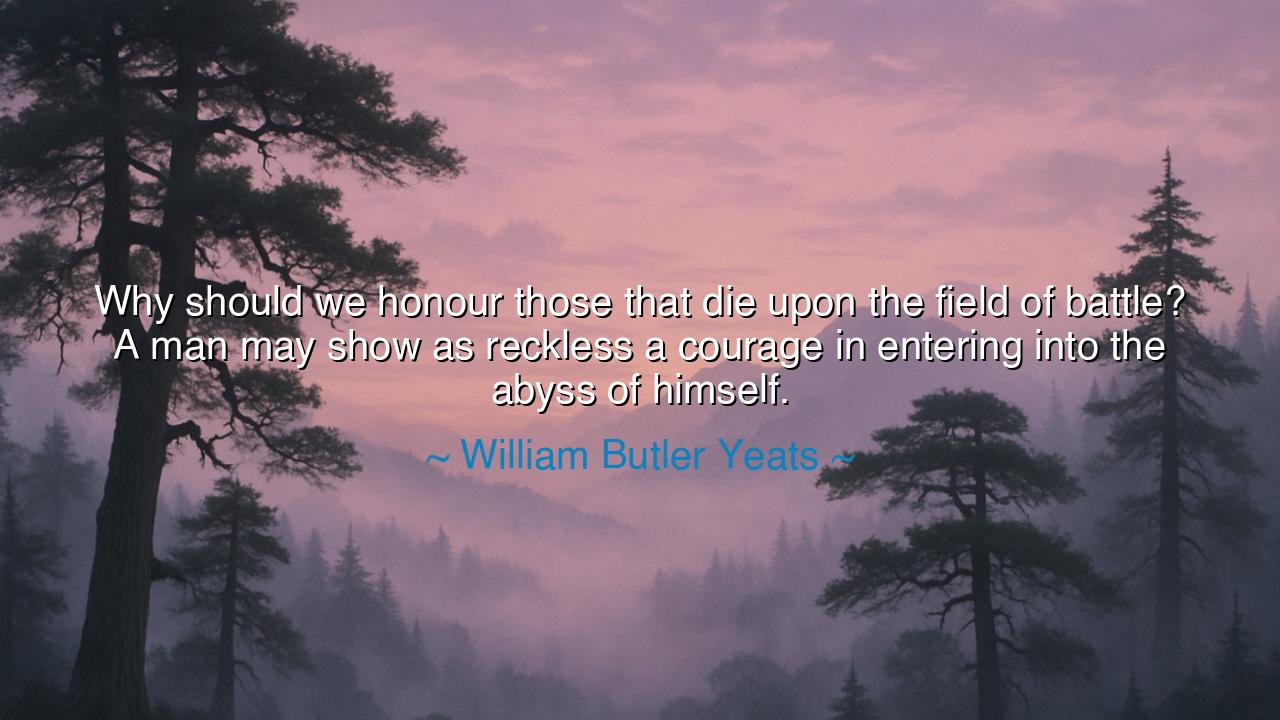
Why should we honour those that die upon the field of battle? A
Why should we honour those that die upon the field of battle? A man may show as reckless a courage in entering into the abyss of himself.






“Why should we honour those that die upon the field of battle? A man may show as reckless a courage in entering into the abyss of himself.” — Thus spoke William Butler Yeats, the poet-mystic of Ireland, whose words bridged the world of myth and the soul of man. In this profound reflection, Yeats dares to challenge the traditional idea of heroism. He does not deny the valor of warriors who shed blood for country or cause, but he reveals another kind of battle — one that is fought not with sword or shield, but within the soul. The poet tells us that to look inward, to descend into the dark abyss of oneself, requires a courage as fierce and consuming as that of any soldier on the battlefield. For to face one’s own truth, stripped of illusion and pride, is the most dangerous war of all.
The origin of this thought lies in Yeats’s lifelong exploration of both the heroic and the spiritual. Living through a time of rebellion, revolution, and cultural awakening, he saw bravery in the streets and bravery in the hearts of thinkers, artists, and seekers. Yet he also saw how easily society glorified external conflict while neglecting the inner one — the battle for meaning, for integrity, for self-knowledge. As a poet steeped in both Celtic mythology and mystical philosophy, Yeats came to understand that man’s outer wars are but reflections of the inner struggle. To conquer one’s enemies may bring fame, but to confront one’s own darkness brings wisdom — and that, he believed, is the nobler triumph.
To enter the abyss of oneself is to descend into the unknown regions of the soul — the fears, regrets, longings, and hidden truths we bury beneath the mask of daily life. It is to strip away all armor, all pretense, and stand naked before one’s own conscience. Such a journey is not glorious in the eyes of the world; there are no medals for it, no parades, no songs. Yet Yeats saw in this inward journey a courage more reckless than war, for there are no allies within the soul, only truth and shadow. The soldier faces a mortal foe; the seeker faces eternity. The soldier risks his life; the seeker risks his self.
History too bears witness to those who dared this descent. Consider Siddhartha Gautama, the Buddha, who left behind wealth, power, and comfort to face the abyss of suffering within himself. He waged no war upon men, but upon illusion — and in conquering it, he brought peace to millions. His battle was not against armies, but against ignorance, desire, and fear, the enemies that dwell within every human heart. Like Yeats’s imagined warrior of the spirit, he emerged from his inner darkness transformed, not victorious in conquest, but illuminated in understanding. Such is the courage Yeats speaks of — the courage to endure the silence of the soul until truth reveals itself.
The abyss within is not a place of peace; it is a tempest. To explore it is to meet one’s own contradictions — to see one’s weakness, pride, and pain without turning away. Many avoid this confrontation, fearing that to look too deeply is to be lost. Yet Yeats reminds us that only through such reckless courage can one be reborn. The outer world is full of battles that distract us, but the real war — the war that defines our destiny — is fought in the heart. Every act of self-reflection, every moment of honesty, every step toward understanding is an act of heroism.
And yet, Yeats does not diminish the bravery of those who fight on fields of war. He expands the very definition of honor. He calls us to recognize that courage takes many forms — that the warrior who conquers fear in silence, the artist who bares his soul to the world, the penitent who confronts his own guilt — all deserve the same reverence as the soldier who dies for his banner. For in each, the same flame burns: the will to face what others flee. True courage is not measured by the battlefield, but by the depth one dares to enter — whether into danger or into the self.
So, my listener of the ages, take this teaching to heart: do not fear the inward journey. The world will tempt you to measure valor by outward deeds, by victories and honors. But the greatest of all triumphs is to know yourself — to wrestle with your own darkness and emerge with compassion, humility, and truth. Do not mistake the quiet seeker for the coward, for he walks paths more perilous than war.
For this is Yeats’s gift to us: the revelation that the soul’s abyss is as vast as any battlefield, and that the one who braves its depths is as noble as any hero of legend. The world may never know the names of such warriors, but eternity remembers them — those who faced themselves and, in doing so, brought light into the darkness of humanity. And so, honor both the soldier and the seeker, but remember this: the bravest of all are those who dare to enter the silence within and return bearing peace.






AAdministratorAdministrator
Welcome, honored guests. Please leave a comment, we will respond soon